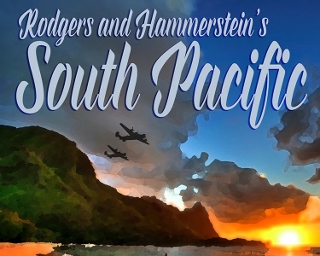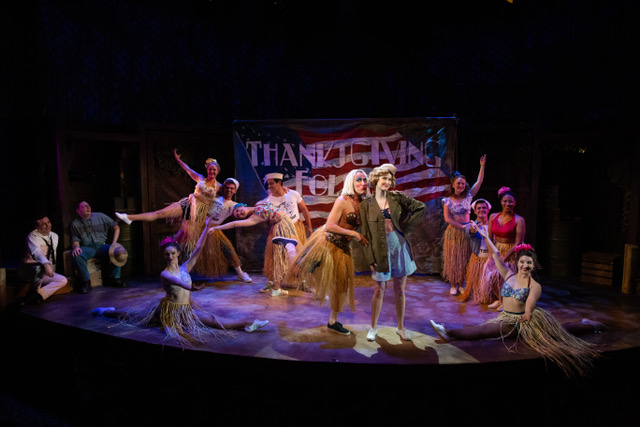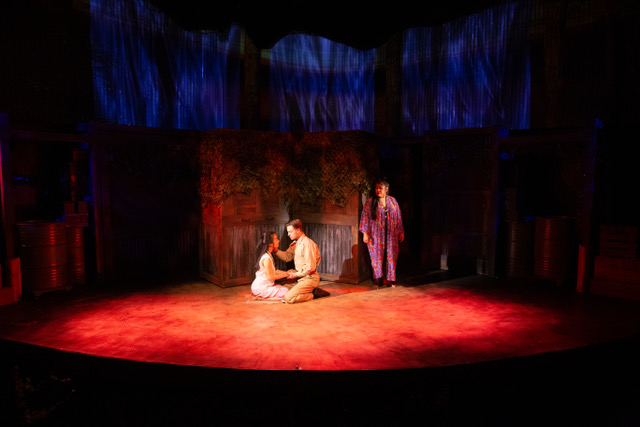SOME ENCHANTED EVENING INDEED
At about 8 am on December 7, 1941, Japanese planes filled the sky over Pearl Harbor, Hawaii. Bombs and bullets rained onto the vessels moored below on the United States Naval Air Base in the Territory of Hawaii in the Pacific. At 8:10, a 1,800-pound bomb smashed through the deck of the battleship USS Arizona and landed in her forward ammunition magazine. The ship exploded and sank with more than 1,000 men trapped inside.
Japan’s hostile reaction was retaliation against the United States’ sanctions against the Empire as it readied to move into China, having declared war against that massive nation in 1937. In all, the Japanese attack on Pearl Harbor crippled or destroyed nearly 20 American ships and more than 300 airplanes. Most important, 2,403 sailors, soldiers and civilians were killed and about 1,000 people were wounded. After the Pearl Harbor attack, and for the first time during years of discussion and debate, the American people were united in their determination to go to war.
![]() This Friday, December 7, marks the anniversary of that “date which will live in infamy.” This is also the day that Rubicon Theatre of Ventura opens an intimate two-piano version of the World War II epic South Pacific, with a score by Richard Rodgers (music) and Oscar Hammerstein II (lyrics), and a book by Hammerstein and Joshua Logan based on James Michener’s Pulitzer Prize-winning novel Tales of the South Pacific.
This Friday, December 7, marks the anniversary of that “date which will live in infamy.” This is also the day that Rubicon Theatre of Ventura opens an intimate two-piano version of the World War II epic South Pacific, with a score by Richard Rodgers (music) and Oscar Hammerstein II (lyrics), and a book by Hammerstein and Joshua Logan based on James Michener’s Pulitzer Prize-winning novel Tales of the South Pacific.
Whenever it’s revived, it’s hard to imagine a more necessary musical than this 1949 Pulitzer Prize winner. 72 years after the Japanese surrender, it remains a healing tribute to resilience in adversity and tolerance in the thick of war. Consummate showmen, Rodgers & Hammerstein knew just why Americans need to believe in themselves and what threatens that faith. Nellie, a “cock-eyed optimist” from Little Rock, stationed with the Seabees in the Pacific, overcomes unnatural prejudices to love an older man, the French plantation owner Emile de Becque, who married a Polynesian woman. Nellie’s small victory for her own humanity is the kind of good we want to believe can come from war.
![]() The enduring show’s other love story concerns an idealistic Princeton grad Lt. John Cable, who tests his tolerance when he adores Liat, the beautiful daughter of Bloody Mary, a feisty middle-aged Tonkinese hawker of grass skirts. The musical wonders: If these characters can’t rise above their lesser selves, what’˜s the point of the larger war they’re fighting?
The enduring show’s other love story concerns an idealistic Princeton grad Lt. John Cable, who tests his tolerance when he adores Liat, the beautiful daughter of Bloody Mary, a feisty middle-aged Tonkinese hawker of grass skirts. The musical wonders: If these characters can’t rise above their lesser selves, what’˜s the point of the larger war they’re fighting?
With a massive cast of 28, including Broadway veterans, this promises to be a most enchanted evening. Having attended many intimate revivals of classic musicals in Chicago, I can assert that the close proximity to the proceedings allows for a more heartfelt experience, especially with talent like Ben Davis (Tony honoree for Baz Luhrmann’s La Bohème) as French plantation owner Emile de Becque, and the amazing Madison Claire Parks as Ensign Nellie Forbush.
Director Katherine Farmer and designer Mike Billings conceived a set made up of military issue pieces that the ensemble will move to create various locales. “The idea is that we as American military in wartime are trying to maneuver and manage what happens on this little island in a culture that has different values than our own,” says Farmer. “The action gives us the illusion of having some control. But there are larger forces at work — God, the beauty and majesty and cruelty of nature, our own complex human natures, our penchant for conflict and war, our capacity for understanding and forgiveness, etc. Some of this will be suggested in mood and metaphor on a larger projection surface behind the set.”
And you wanna talk happy talk? The standards from the show are a treasure trove of American music: among them are “This Nearly Was Mine,” “A Wonderful Guy,” “I’m Gonna Wash That Man Right Out-a My Hair,” “Younger Than Springtime,” “Honey Bun” and “You’ve Got To Be Carefully Taught” ’” Hammerstein’s unanswerable and timeless diagnosis of bigotry which will be sung by the versatile Alex Nee (awesome in Celebrations’ Cabaret) as Lt. Cable.
Singing “Bali Ha’i” and “Happy Talk” will be Jodi Kimura, who I’ve seen twice as Bloody Mary, and the chance to see her up close is thrilling. With a simmering stew of disgust, anger, and desperation combined with a mysterious merriment and weary wisdom that makes her both playful and sad, Kimura is a revelation. As if this show wasn’t a wondrous journey on it own, her extra-exotic performance is a travelogue in itself. Do not miss this South Pacific, which only runs through December 23, 2018.
photos by Jeanne Tanner
South Pacific
Rubicon Theatre Company
1006 E. Main Street in Ventura
Wed at 2 & 7; Thurs at 7; Fri at 8; Sat at 2 & 8; Sun at 2
ends on December 23, 2018
for tickets, call 805.667.2900 or visit Rubicon



